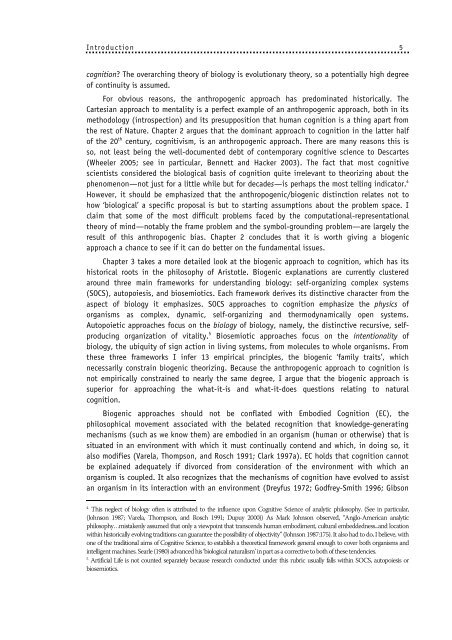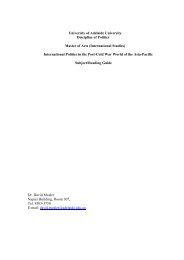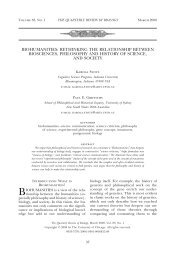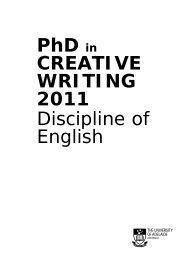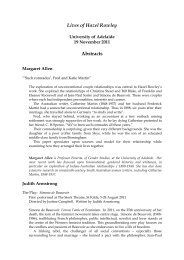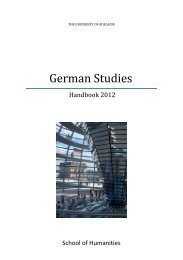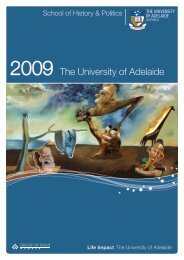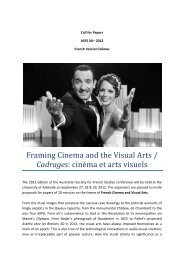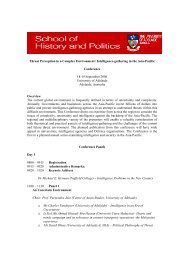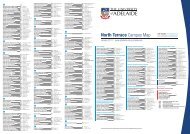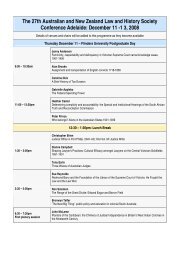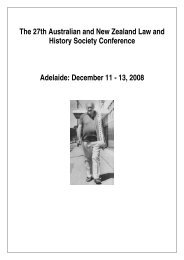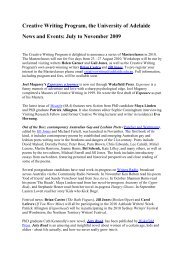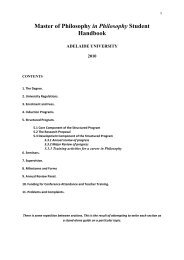Introduction - Faculty of Humanities & Social Sciences
Introduction - Faculty of Humanities & Social Sciences
Introduction - Faculty of Humanities & Social Sciences
Create successful ePaper yourself
Turn your PDF publications into a flip-book with our unique Google optimized e-Paper software.
Introdu ctio n 5<br />
cognition? The overarching theory <strong>of</strong> biology is evolutionary theory, so a potentially high degree<br />
<strong>of</strong> continuity is assumed.<br />
For obvious reasons, the anthropogenic approach has predominated historically. The<br />
Cartesian approach to mentality is a perfect example <strong>of</strong> an anthropogenic approach, both in its<br />
methodology (introspection) and its presupposition that human cognition is a thing apart from<br />
the rest <strong>of</strong> Nature. Chapter 2 argues that the dominant approach to cognition in the latter half<br />
<strong>of</strong> the 20 th century, cognitivism, is an anthropogenic approach. There are many reasons this is<br />
so, not least being the well-documented debt <strong>of</strong> contemporary cognitive science to Descartes<br />
(Wheeler 2005; see in particular, Bennett and Hacker 2003). The fact that most cognitive<br />
scientists considered the biological basis <strong>of</strong> cognition quite irrelevant to theorizing about the<br />
phenomenon—not just for a little while but for decades—is perhaps the most telling indicator. 4<br />
However, it should be emphasized that the anthropogenic/biogenic distinction relates not to<br />
how ‘biological’ a specific proposal is but to starting assumptions about the problem space. I<br />
claim that some <strong>of</strong> the most difficult problems faced by the computational-representational<br />
theory <strong>of</strong> mind—notably the frame problem and the symbol-grounding problem—are largely the<br />
result <strong>of</strong> this anthropogenic bias. Chapter 2 concludes that it is worth giving a biogenic<br />
approach a chance to see if it can do better on the fundamental issues.<br />
Chapter 3 takes a more detailed look at the biogenic approach to cognition, which has its<br />
historical roots in the philosophy <strong>of</strong> Aristotle. Biogenic explanations are currently clustered<br />
around three main frameworks for understanding biology: self-organizing complex systems<br />
(SOCS), autopoiesis, and biosemiotics. Each framework derives its distinctive character from the<br />
aspect <strong>of</strong> biology it emphasizes. SOCS approaches to cognition emphasize the physics <strong>of</strong><br />
organisms as complex, dynamic, self-organizing and thermodynamically open systems.<br />
Autopoietic approaches focus on the biology <strong>of</strong> biology, namely, the distinctive recursive, selfproducing<br />
organization <strong>of</strong> vitality. 5 Biosemiotic approaches focus on the intentionality <strong>of</strong><br />
biology, the ubiquity <strong>of</strong> sign action in living systems, from molecules to whole organisms. From<br />
these three frameworks I infer 13 empirical principles, the biogenic ‘family traits’, which<br />
necessarily constrain biogenic theorizing. Because the anthropogenic approach to cognition is<br />
not empirically constrained to nearly the same degree, I argue that the biogenic approach is<br />
superior for approaching the what-it-is and what-it-does questions relating to natural<br />
cognition.<br />
Biogenic approaches should not be conflated with Embodied Cognition (EC), the<br />
philosophical movement associated with the belated recognition that knowledge-generating<br />
mechanisms (such as we know them) are embodied in an organism (human or otherwise) that is<br />
situated in an environment with which it must continually contend and which, in doing so, it<br />
also modifies (Varela, Thompson, and Rosch 1991; Clark 1997a). EC holds that cognition cannot<br />
be explained adequately if divorced from consideration <strong>of</strong> the environment with which an<br />
organism is coupled. It also recognizes that the mechanisms <strong>of</strong> cognition have evolved to assist<br />
an organism in its interaction with an environment (Dreyfus 1972; Godfrey-Smith 1996; Gibson<br />
4<br />
This neglect <strong>of</strong> biology <strong>of</strong>ten is attributed to the influence upon Cognitive Science <strong>of</strong> analytic philosophy. (See in particular,<br />
(Johnson 1987; Varela, Thompson, and Rosch 1991; Dupuy 2000)) As Mark Johnson observed, “Anglo-American analytic<br />
philosophy…mistakenly assumed that only a viewpoint that transcends human embodiment, cultural embeddedness...and location<br />
within historically evolving traditions can guarantee the possibility <strong>of</strong> objectivity” (Johnson 1987:175). It also had to do, I believe, with<br />
one <strong>of</strong> the traditional aims <strong>of</strong> Cognitive Science, to establish a theoretical framework general enough to cover both organisms and<br />
intelligent machines. Searle (1980) advanced his ‘biological naturalism’ in part as a corrective to both <strong>of</strong> these tendencies.<br />
5<br />
Artificial Life is not counted separately because research conducted under this rubric usually falls within SOCS, autopoiesis or<br />
biosemiotics.


